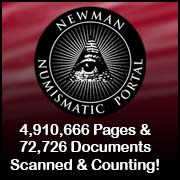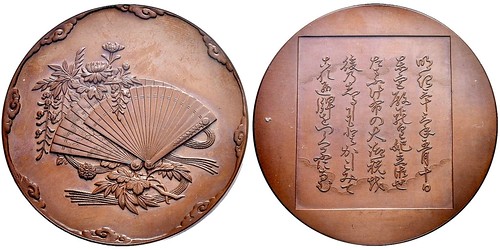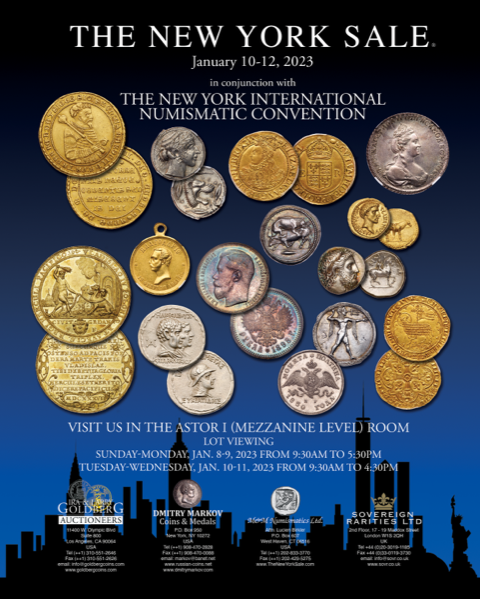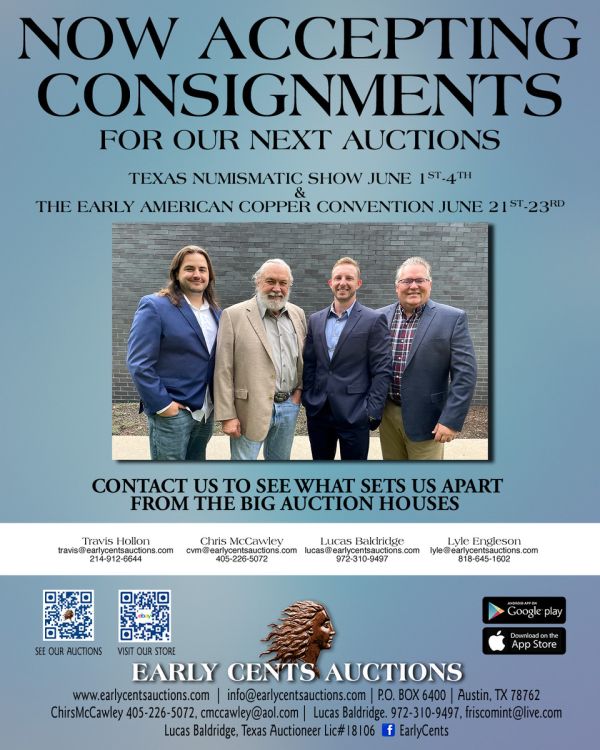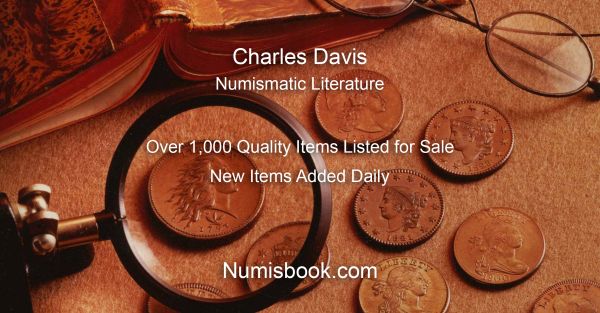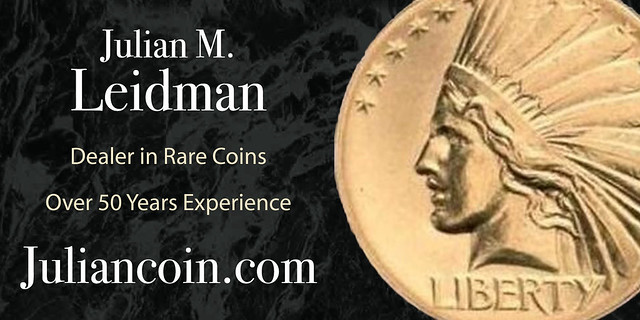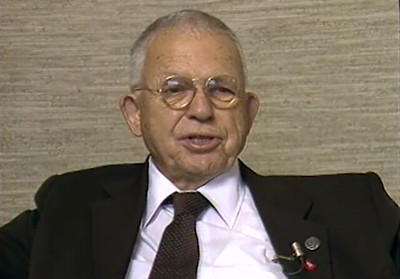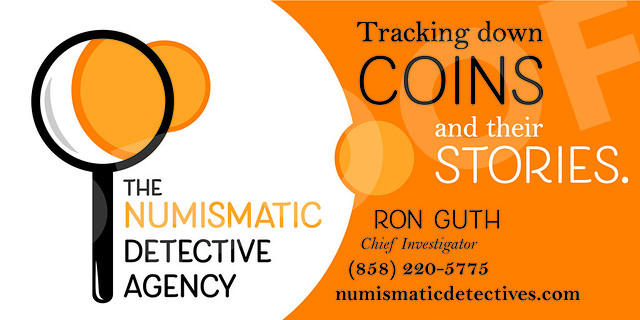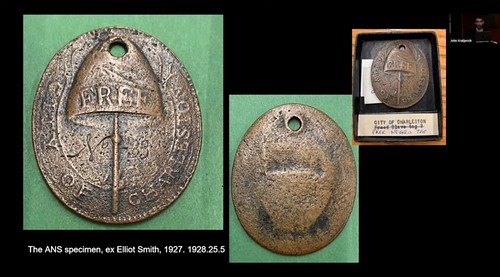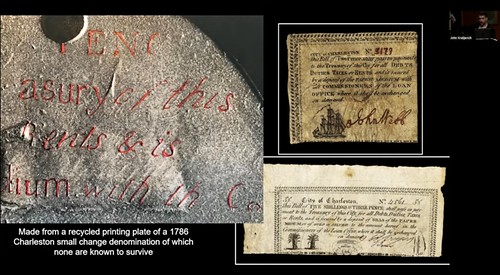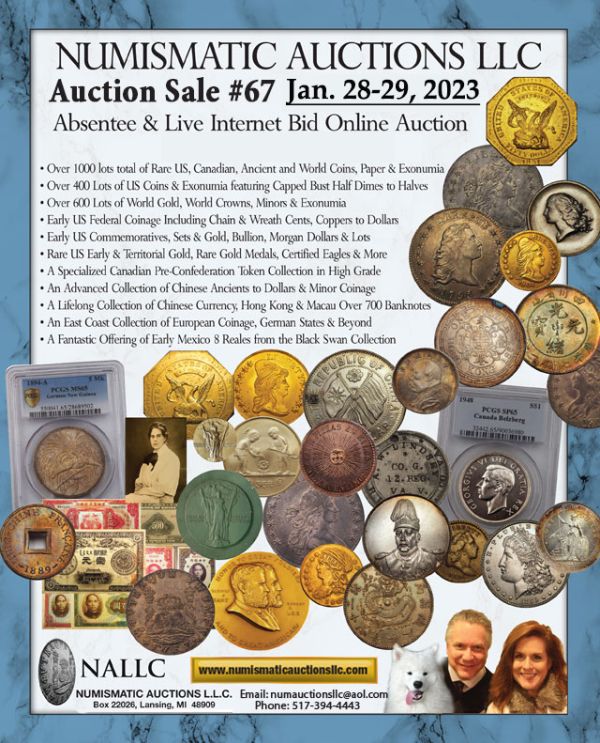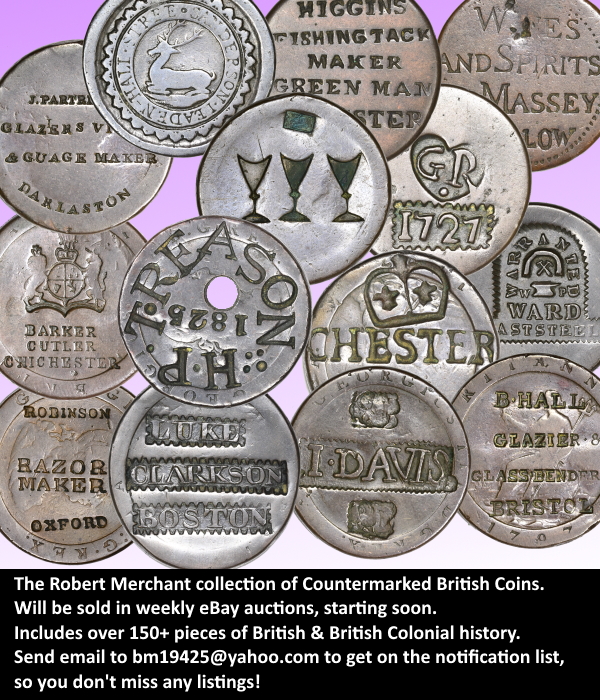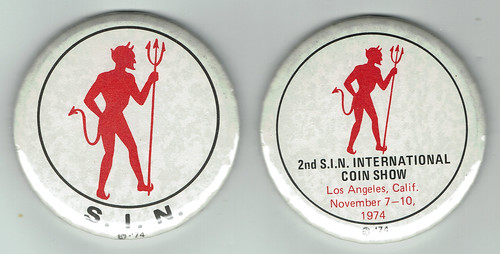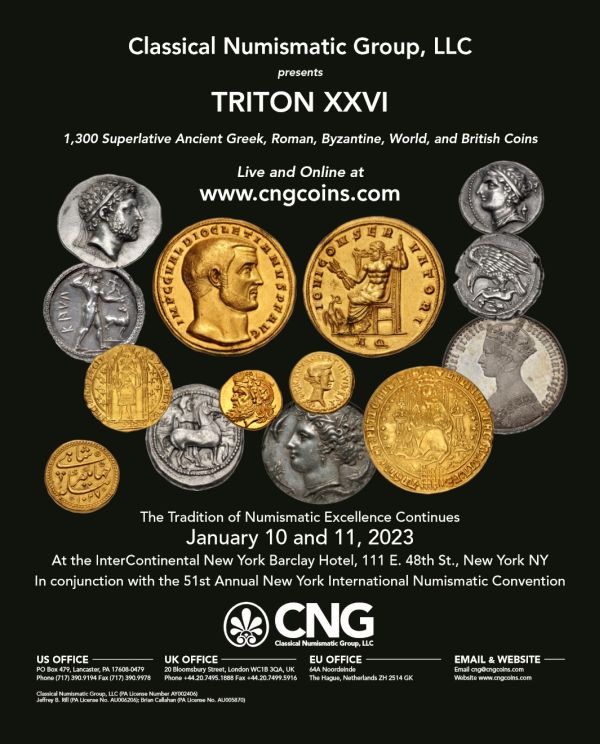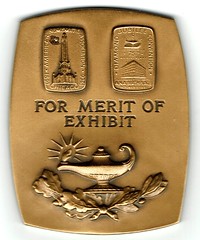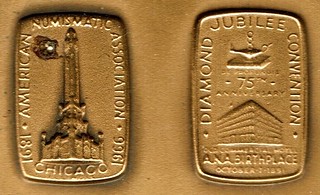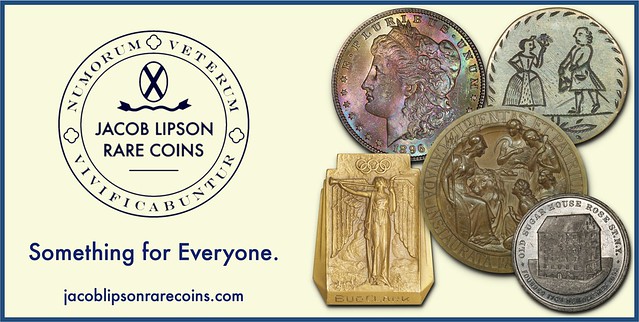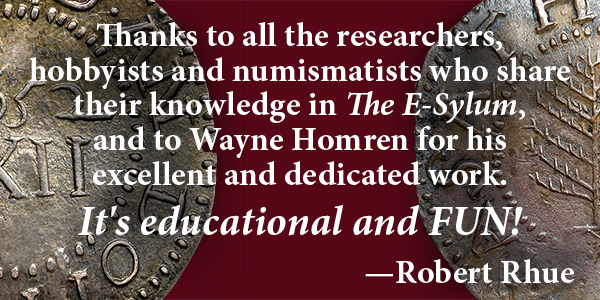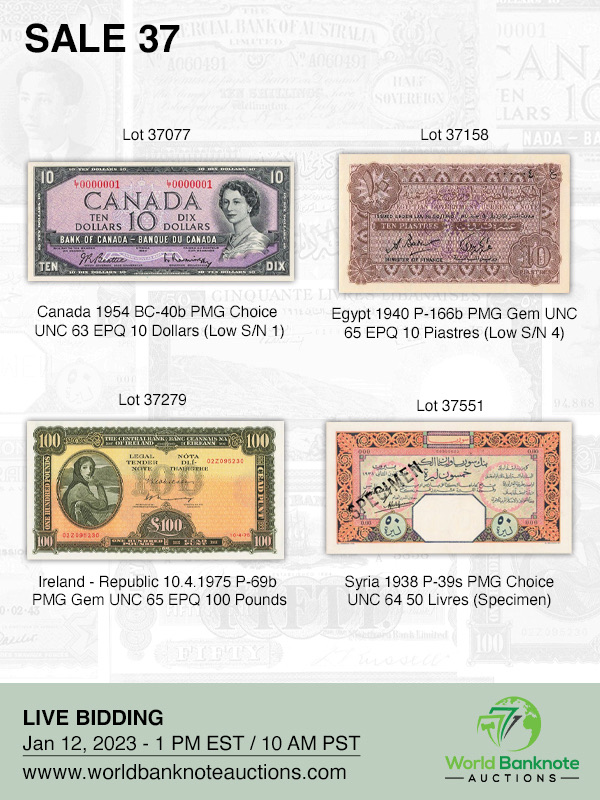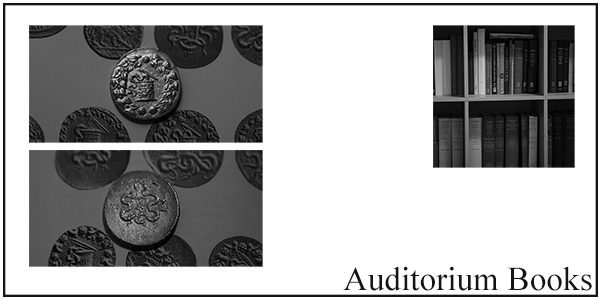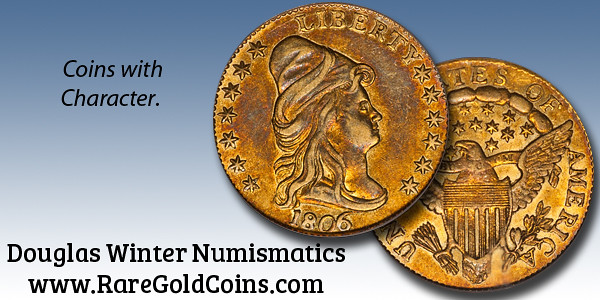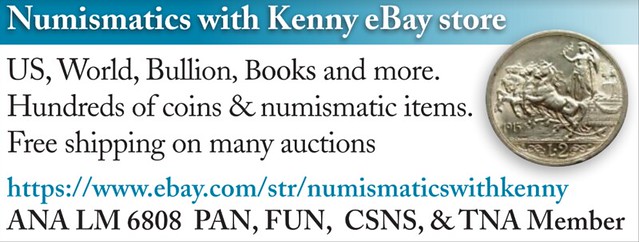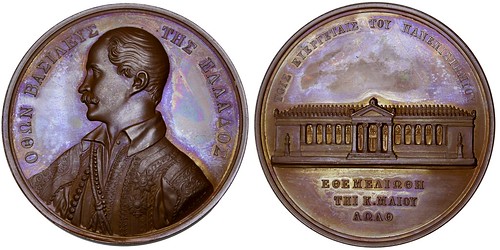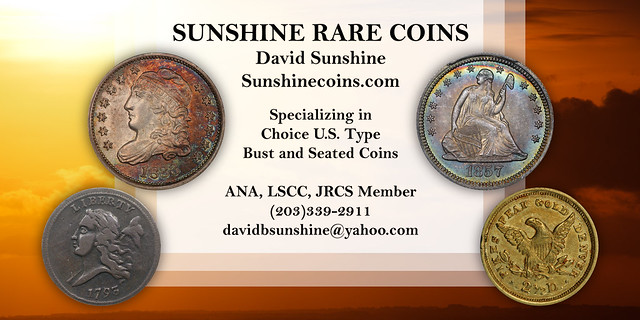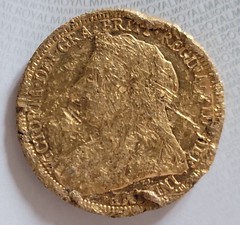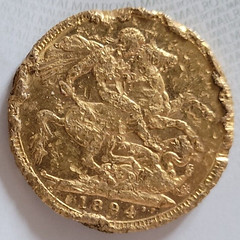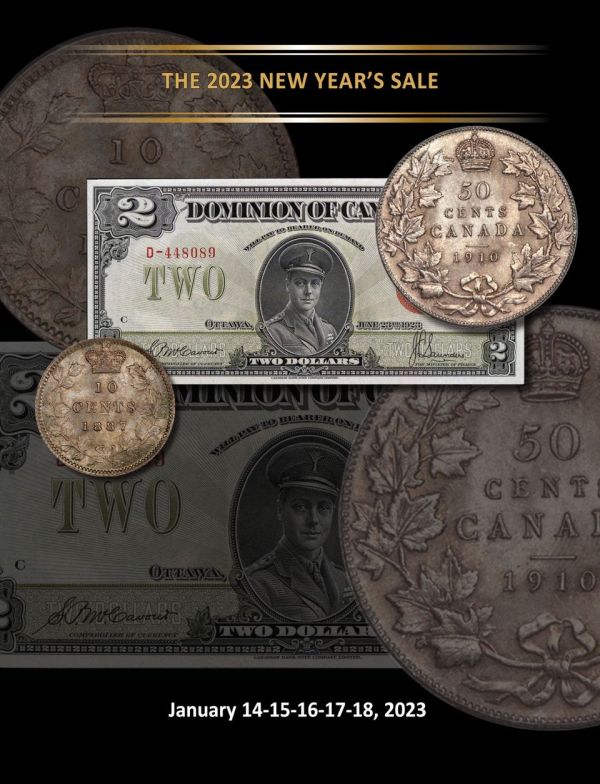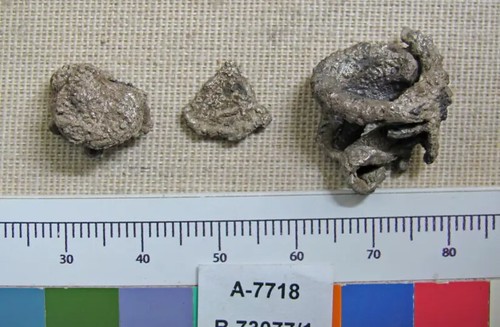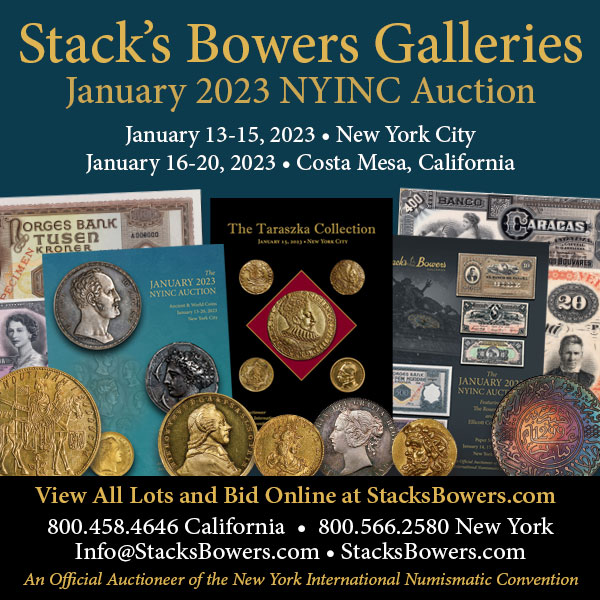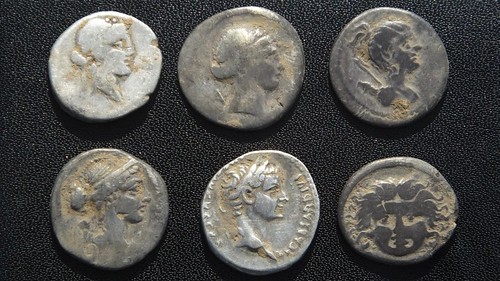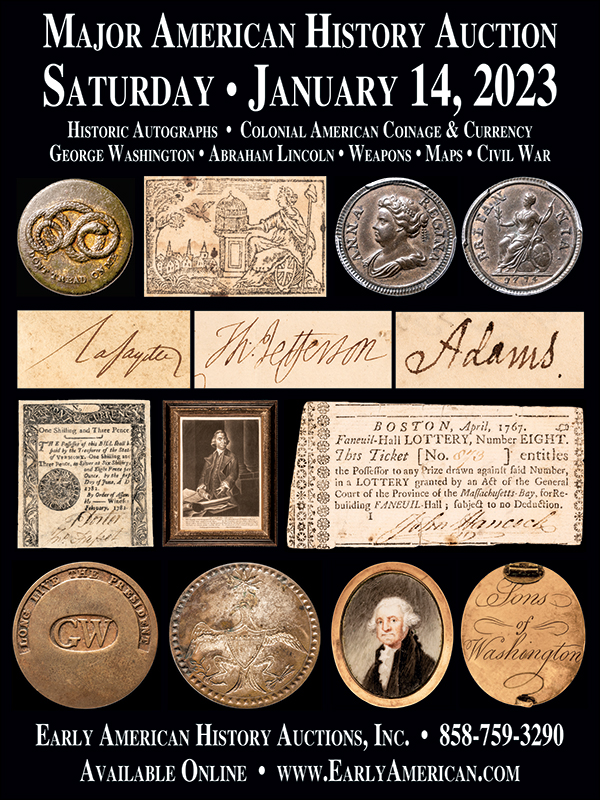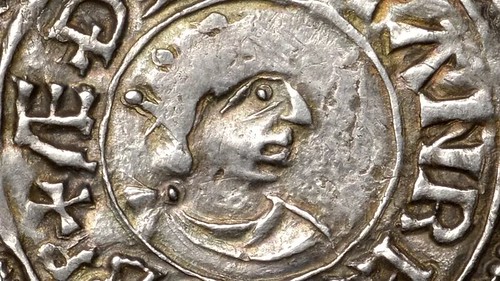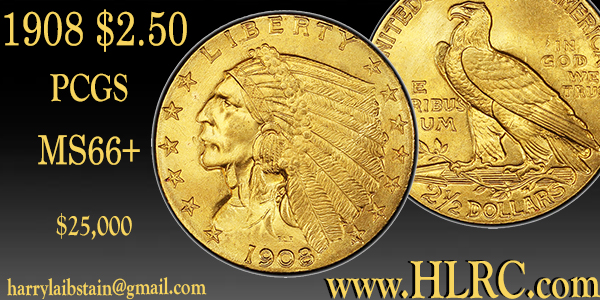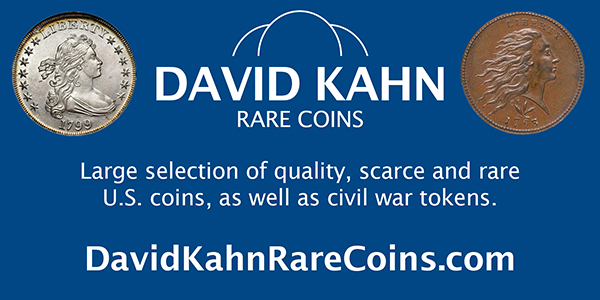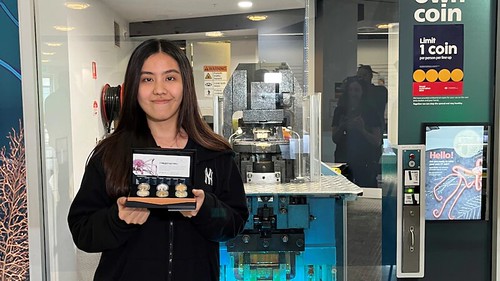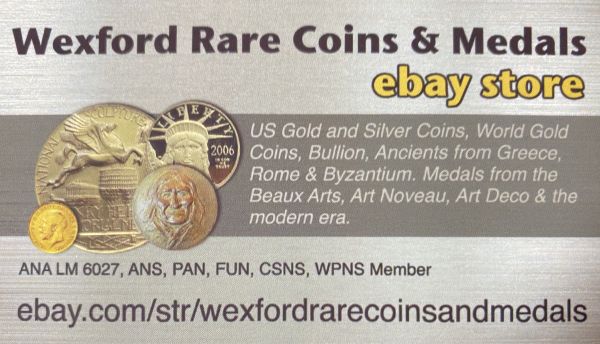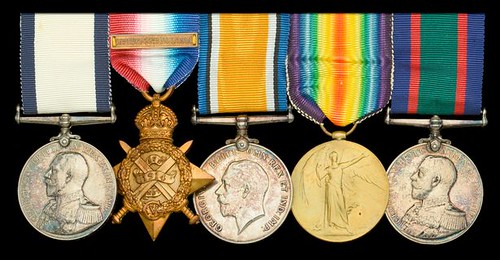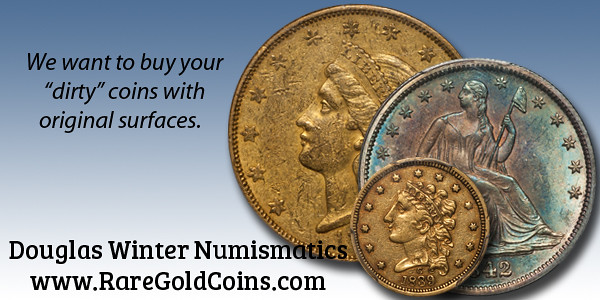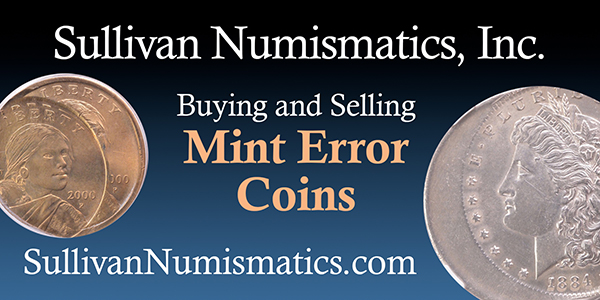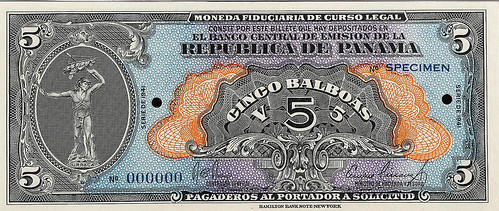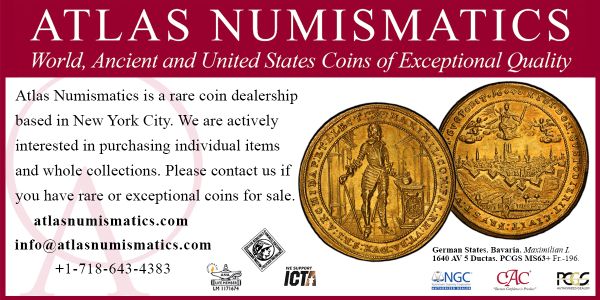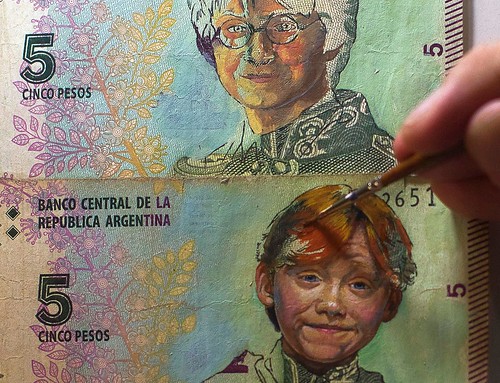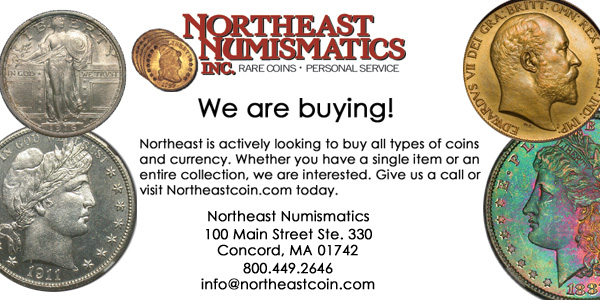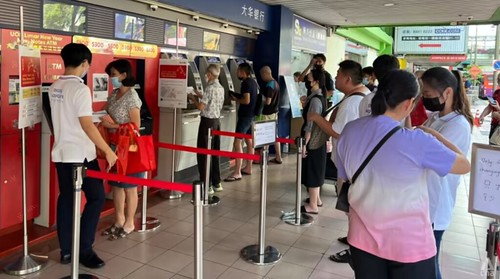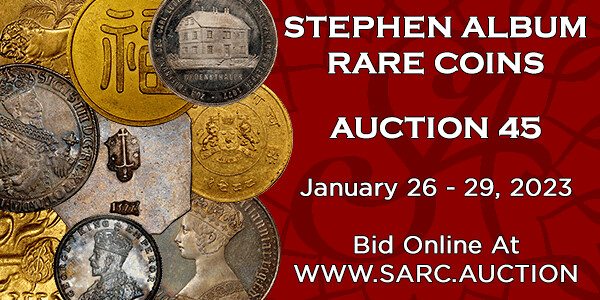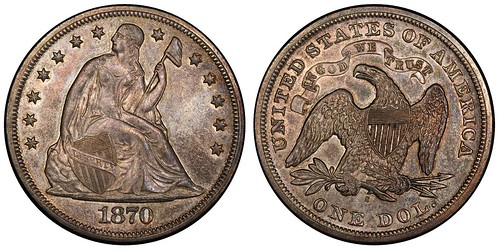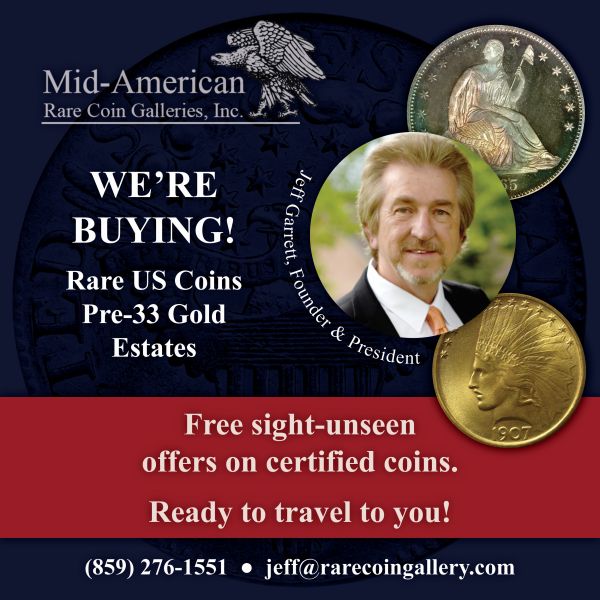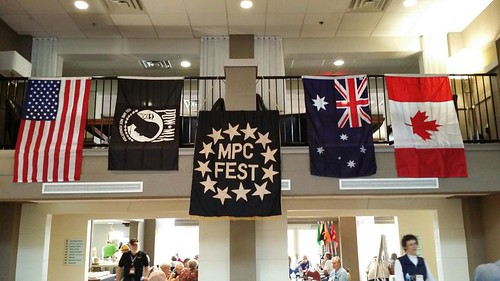
Visit our NBS Sponsors




About UsThe Numismatic Bibliomania Society is a non-profit association devoted to the study and enjoyment of numismatic literature. For more information please see our web site at coinbooks.org SubscriptionsThose wishing to become new E-Sylum subscribers (or wishing to Unsubscribe) can go to the following web page link MembershipThere is a membership application available on the web site Membership Application To join, print the application and return it with your check to the address printed on the application. Print/Digital membership is $40 to addresses in the U.S., and $60 elsewhere. A digital-only membership is available for $25. For those without web access, write to: Charles Heck, Treasurer AsylumFor Asylum mailing address changes and other membership questions, contact Chuck at this email address: treasurer@coinbooks.org SubmissionsTo submit items for publication in The E-Sylum, write to the Editor at this address: whomren@gmail.com BUY THE BOOK BEFORE THE COINSale CalendarWatch here for updates! |
- WAYNE'S WORDS: THE E-SYLUM JANUARY 8, 2023
- CHARLES DAVIS AT 2023 NYINC
- WHITMAN PUBLISHING'S 2023 NEW BOOKS
- DOUGLAS FRANCIS BIRD (1944-2023)
- AMERICAN NUMISMATIC BIOGRAPHIES REVISED
- NEWMAN PORTAL ADDS CCAC ANNUAL REPORTS
- VIDEO: JOHN JAY PITTMAN
- VIDEO: SLAVE BADGES, VERMONT COPPERS, SPONSIAN
- AUDIO: MCDOWELL, SCHENKMAN
- MORE ON PAULINE PAULING EMMETT
- MORE ON MEDALS WITH PRECIOUS STONES
- NOTES FROM E-SYLUM READERS: JANUARY 8, 2023
- QUERY: ALBERT LEVITT AND THE 1921 ASSAY COMMISSION
- VOCABULARY TERM: METAL CLEANING
- FINDING AND BINDING SPINK'S NUMISMATIC CIRCULAR
- BRITISH NUMISMATIC SOCIETY MEETING AT NYINC
- 2024 AIA/SCS CALL FOR PAPERS
- NUMISMAGRAM SELECTIONS: JANUARY 8, 2023
- NUMISMATIC NUGGETS: JANUARY 8, 2023
- USE OF SILVER AS MONEY IN ISRAEL
- BAR KOCHBA REVOLT COIN FOUND IN ISRAEL
- SHROPSHIRE HOARD DECLARED TREASURE
- ATHELSTAN MUSEUM BUYS KING'S COIN
- THE MYSTERY OF THE RED QUARTERS
- STUDENT STRIKES FIRST 2023 AUSTRALIAN COIN
- GALLIPOLI CONSPICUOUS GALLANTRY MEDAL
- BIDEN AWARDS PRESIDENTIAL CITIZENS MEDALS
- THE
ARIAS ISSUE
PANAMANIAN BANKNOTES - ARGENTINE ARTIST PAINTS ON BANK NOTES
- 2023 CHINESE NEW YEAR BANKNOTES
- LOOSE CHANGE: JANUARY 8, 2023
- ABOUT THOSE COIN ADS IN COMIC BOOKS
- FEATURED WEBSITE: MPC FEST
Click here to read the thin version on the web
Click here to subscribe
Click here to access the complete archive
To comment or submit articles, reply to whomren@gmail.com
Content presented in The E-Sylum is not necessarily researched or independently fact-checked, and views expressed do not necessarily represent those of the Numismatic Bibliomania Society.
WAYNE'S WORDS: THE E-SYLUM JANUARY 8, 2023
 New subscribers this week include:
Harold Davis, courtesy of Wayne Davis; and
the Redcliffe Numismatic Society.
Welcome aboard!
New subscribers this week include:
Harold Davis, courtesy of Wayne Davis; and
the Redcliffe Numismatic Society.
Welcome aboard!
Thank you for reading The E-Sylum. If you enjoy it, please send me the email addresses of friends you think may enjoy it as well and I'll send them a subscription. Contact me at whomren@gmail.com anytime regarding your subscription, or questions, comments or suggestions about our content.
This week we open with numismatic literature at NYINC, several new book announcements, updates from the Newman Numismatic Portal, videos, podcasts and more.
Other topics this week include slave badges, Vermont coppers, medals with precious stones, John Jay Pittman, Chris McDowell, Dave Schenkman, Albert Levitt, metal cleaning, coin finds in Israel and elsewhere, the Conspicuous Gallantry Medal, the Presidential Citizens Medal, coin ads in comic books, Chinese New Year notes and the first 2023 coins struck in Australia.
To learn more about medals and money in Black America, the Numismatic Book Shop, the Citizens Coinage Advisory Committee, Numisma, Spink's Numismatic Circular, the War of 1812 in American and British medals, King Athelstan, the mystery of the red quarters, "Arias issue" banknotes of Panama, mint mark collecting, MPC Fest, and vibratory bowls, read on. Have a great week, everyone!
Wayne Homren
Editor, The E-Sylum
CHARLES DAVIS AT 2023 NYINC
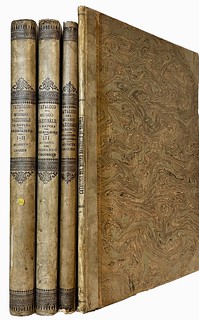 Numismatic literature dealer Charlie Davis writes:
Numismatic literature dealer Charlie Davis writes:
"I will have a table (No. 906) at the New York International Show, New York InterContinental Barclay, 111 E 48th Street, New York, January 12-15."
Charlie sent these photos of stock recently purchased from a European dealer that will be available at the show. -Editor
WHITMAN PUBLISHING'S 2023 NEW BOOKS
Whitman Publishing has been busy behind the scenes and is planning a busy 2023 publishing season. This press release details the firm's plans for the year. Watch The E-Sylum for details as each new book makes its debut. -Editor
Whitman Publishing announces a slate of new books and hobby supplies that will be available in 2023. The lineup includes titles on U.S. and world coins, tokens and medals, numismatic history, and memoirs, as well as archival-quality Whitman and H.E. Harris folders, albums, and other display and storage products.
Founded in 1916, Whitman is the world's leading producer of numismatic reference books, supplies, and products to display and store coins and paper money. The company will release new folders and albums for the American Women quarters and other United States Mint coins, and continues its Glorifier Series of magnetic-closure acrylic display cases.
DOUGLAS FRANCIS BIRD (1944-2023)
E-Sylum Feature Writer and American Numismatic Biographies author Pete Smith submitted this article on early American copper specialist Doug Bird, who passed away this weekend. Thank you. Sorry to hear the news. The first image was added courtesy Al Boka via Mark Borckardt. -Editor
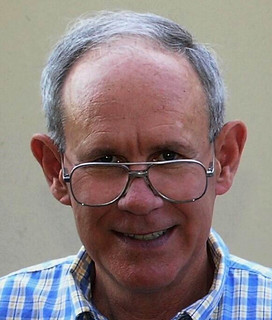 An email message from Chuck Heck on Saturday, January 7, had the notice that long-time EAC
dealer Doug Bird had died on Thursday, January 5, 2023.
An email message from Chuck Heck on Saturday, January 7, had the notice that long-time EAC
dealer Doug Bird had died on Thursday, January 5, 2023.
Doug Bird was born on June 25, 1944, in Boston, Massachusetts. He received a BBA from Loyola University in Los Angeles in 1966. The Army called him to service during 1967-68 including a thirteen-month tour in Vietnam. He was married with a son, Doug Jr.
Doug began collecting coins in 1953 and joined EAC in 1973. He was LM-2763 with the ANA. He was employed in the real world as director of human resources 1969 to 1982. During that time, he was a part-time coin dealer. He made coin dealing a full-time business in 1982 specializing in early copper and type coins.
AMERICAN NUMISMATIC BIOGRAPHIES REVISED
Speaking of mortality, Pete Smith submitted this call for updates to his American Numismatic Biographies book. None of us is getting any younger, and now is a great time to record numismatist biographical details. -Editor
I suspect many E-Sylum readers have biographies on ANB. I invite readers to look themselves up and report back to me if their information is correct or should be revised.
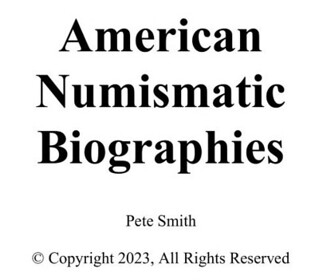 In the last six months of 2022, I added hundreds of new names to American Numismatic
Biographies and made four thousand changes. The 2023 revised version may be found on the
Newman Numismatic Portal at
https://nnp.wustl.edu/library/book/304.
In the last six months of 2022, I added hundreds of new names to American Numismatic
Biographies and made four thousand changes. The 2023 revised version may be found on the
Newman Numismatic Portal at
https://nnp.wustl.edu/library/book/304.
Many of the listings are incomplete placeholder
listings waiting for more information to be
added. I am not looking for promotional hype but rather solid facts.
Individual entries from ANB are extracted and presented in the People
section of the Newman
Numismatic Portal. It will take a while for the 2022 changes to be posted.
THE BOOK BAZARRE
NEWMAN PORTAL ADDS CCAC ANNUAL REPORTS
The latest addition to the Newman Numismatic Portal is the 2022 CCAC Annual Report. Project Coordinator Len Augsburger provided the following background. -Editor
CCAC Annual Reports
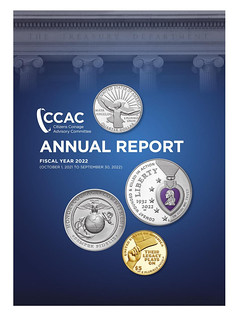 The 2022 fiscal year (October 1, 2021 – September 3, 2022) annual report of the Citizens Coinage Advisory Committee was recently issued, and the greatly expanded format, initiated in 2020, once again gives a full picture of this organization that helps guide the artistic direction of the U.S. Mint. Meetings and candidate designs are thoroughly detailed, in addition to useful appendices that provide committee minutes, committee member bios, and a historical census of the membership.
The 2022 fiscal year (October 1, 2021 – September 3, 2022) annual report of the Citizens Coinage Advisory Committee was recently issued, and the greatly expanded format, initiated in 2020, once again gives a full picture of this organization that helps guide the artistic direction of the U.S. Mint. Meetings and candidate designs are thoroughly detailed, in addition to useful appendices that provide committee minutes, committee member bios, and a historical census of the membership.
These reports will be an invaluable guide to numismatic historians of the future seeking insights into the development of today's Mint products. Such information is often challenging to extract from 19th and 20th century archives, and the CCAC is to be acknowledged for carefully documenting their work in this area.
Link to CCAC Home Page:
https://www.ccac.gov/
Link to CCAC Annual Reports on Newman Portal:
https://nnp.wustl.edu/library/publisherdetail/511734
VIDEO: JOHN JAY PITTMAN
The David Lisot Video Library on the Newman Numismatic Portal can be found at:
https://nnp.wustl.edu/library/multimediadetail/522852
We highlight one of his videos each week in The E-Sylum. Here's one from 1986 with collector and ANA officer John Jay Pittman. -Editor
VIDEO: SLAVE BADGES, VERMONT COPPERS, SPONSIAN
In the age of YouTube and Zoom, numismatic videos are far more common and available today than back in the 1980s when David Lisot did his pioneering videography. Here are just a few to consider watching this week. -Editor
John Kraljevich, Slave Badges and Dog Tags
2022 Stack Family Lecture on American Numismatics: Slave Badges and Dog Tags: Personal Artifacts of Enslaved and Free African-Americans Before 1865
In the whole realm of material culture, very few objects can be unquestionably ascribed to the possession of African-Americans before 1865. However, in spite of the overall rarity of these sorts of items, two significant groups of intensely personal objects can be classed as numismatic.
From 1783 to 1865, Charleston, South Carolina officially produced identification badges for African-Americans, first exclusively for free persons, then exclusively for enslaved Americans who were to be hired out by their masters. Made of metal and intended for personal display, the Charleston badges are at least loosely similar to the identification discs or dog tags
made for Black men who fought for the Union in the Civil War and small numbers of formerly enslaved African-Americans, mostly in Washington, DC. Join ANS Fellow John Kraljevich, a numismatist and historian, for an exploration of these items, their lessons, and broader themes of African-American history.
On Saturday, December 10, 2022, ANS Fellow John Kraljevich presented the first Stack Family Lecture on American Numismatics, entitled, Slave Badges and Dog Tags: Personal Artifacts of Enslaved and Free African-Americans Before 1865.
Fascinating - well worth watching.
-Editor
To watch, see:
Slave Badges and Dog Tags: Personal Artifacts of Enslaved and Free African-Americans Before 1865
(https://www.youtube.com/watch?v=eECKuP--xzw)
AUDIO: MCDOWELL, SCHENKMAN
There are so many great numismatic podcast episodes these days that it's hard to keep up. Here are a couple well worth a listen. -Editor
A Conversation with Chris McDowell
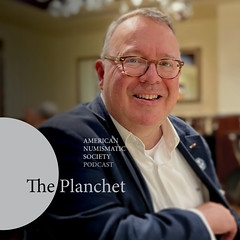 Christopher R. McDowell is a lifelong numismatist and recognized expert in the area of colonial coinage and medals. He is the author of Abel Buell and the History of the Connecticut and Fugio Coinages along with several award-winning articles on American colonial coins and medals. An ANS Fellow, Chris is also the editor of the Journal of Early American Numismatics. A graduate of Marshall University and West Virginia University College of Law, Chris served as an officer in the U.S. Army Judge Advocate General's Corps and was stationed in Korea, Germany, Bosnia, and Kansas. He currently practices law in Cincinnati, Ohio. His newest book is titled The Early Betts Medal Companion: Medals of America's Discovery and Colonization (1492–1737) published by the American Numismatic Society in 2022. The idea for the book grew from Chris' interest in Charles Wyllys Betts and American colonial history and medals. In this episode we talk about Betts medals and their eponymous collector, how Chris got his start in the hobby, and his favorite numismatic colonial crime.
Christopher R. McDowell is a lifelong numismatist and recognized expert in the area of colonial coinage and medals. He is the author of Abel Buell and the History of the Connecticut and Fugio Coinages along with several award-winning articles on American colonial coins and medals. An ANS Fellow, Chris is also the editor of the Journal of Early American Numismatics. A graduate of Marshall University and West Virginia University College of Law, Chris served as an officer in the U.S. Army Judge Advocate General's Corps and was stationed in Korea, Germany, Bosnia, and Kansas. He currently practices law in Cincinnati, Ohio. His newest book is titled The Early Betts Medal Companion: Medals of America's Discovery and Colonization (1492–1737) published by the American Numismatic Society in 2022. The idea for the book grew from Chris' interest in Charles Wyllys Betts and American colonial history and medals. In this episode we talk about Betts medals and their eponymous collector, how Chris got his start in the hobby, and his favorite numismatic colonial crime.
Total Time: 44:11
Music: Piet Hein (de Zilvervloot)
, a traditional drinking song commemorating the capture of the Spanish silver fleet by the Dutch in 1628.
From the American Numismatic Society podcast The Planchet. -Editor
To listen, see:
S3, Ep. 9. A Conversation with Chris McDowell
(https://numismatics.org/pocketchange/03-09/)
To read the earlier E-Sylum article, see:
NEW BOOK: THE EARLY BETTS MEDAL COMPANION
(https://www.coinbooks.org/v25/esylum_v25n48a04.html)
MORE ON PAULINE PAULING EMMETT
Clifford Mishler writes:
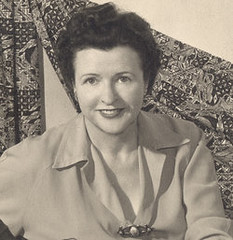 "I enjoyed an interaction with Pauline over some years back in the late-60s to early 70s . . . primarily through correspondence . . . knowing her as Pauline Ney at the time.
"I enjoyed an interaction with Pauline over some years back in the late-60s to early 70s . . . primarily through correspondence . . . knowing her as Pauline Ney at the time.
"I often encountered her while attending the late and lamented COIN (Convention of International Numismatics) shows in Los Angeles . . . even had the welcome opportunity to visit her Santa Monica shop while enjoying a driving trip through the Southwest . . . in 1961 . . . maybe it was 1962. I remember it as a nicely appointed business location . . . and recall that it was an active arena on the occasion of my visit.
"While I believe I was a member of SIN for a time, which was closely affiliated with COIN, I don't really have any detailed information that I might share on the organization . . . it being locally based . . . I believe I may have joined the organization while visiting Pauline's show . . . I do recall that I met one or two local members/officers who happened to be in the shop at the time.
"My association with Pauline originated as a consequence of her purchase of examples of the Alaska-Hawaii Statehood medals that I issued in 1959 . . . she was an active collector and dealer in so-called dollar issues at the time . . . alongside the world and U.S. coins which she stocked in the shop.
"One of my recollections of Pauline is that at one of the COIN shows that I attended . . . and perhaps on one or two other occasions . . . she exhibited her brother Linus Pauling's pair of Nobel Prize medals . . . I seem to recall her telling me that he was a candidate for a third . . . in medicine . . . he being a strong advocate of the properties and benefits of Vitamin C.
"Pauline was an interesting lady, to say the least, one with a unique association . . . she had the good fortune to enjoy a long and rewarding life."
Thank you. Pete Smith passed along these images of two advertising mirrors for the organization Pauline co-founded. Thanks. -Editor
Pete adds:
"These are examples that illustrate how history is illuminated by the objects that are left behind."
To read the earlier E-Sylum article, see:
PAULINE PAULING EMMETT (1902-2003)
(https://www.coinbooks.org/v26/esylum_v26n01a12.html)
MORE ON MEDALS WITH PRECIOUS STONES
Pete Smith submitted these thoughts on medals with embedded precious stones. Thanks. -Editor
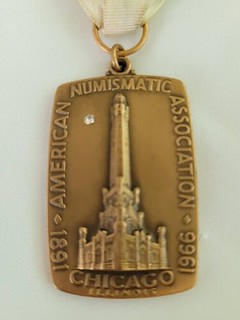 Recent discussion of medals with precious stones brought to mind the ANA convention medals
issued in 1966. The convention badge had a name badge and hanging red, white and blue ribbon
and hanging bronze medal.
Recent discussion of medals with precious stones brought to mind the ANA convention medals
issued in 1966. The convention badge had a name badge and hanging red, white and blue ribbon
and hanging bronze medal.
The building shown on the badge is a representation of the Chicago Water Tower. The white dot in the field near the upper left is a small diamond chip as the 1966 convention was the 75-year diamond jubilee for the ANA.
Less frequently seen is the exhibitor medal. It features the convention badge with a reproduction at the top. The black dot on the badge near the left top is a hole that once contained a diamond chip. I don't know the story but I can guess that a previous owner removed the diamond thinking it could be sold at a great price.
I suspect that owner found the diamond to be worthless and the medal without the diamond was worth-less. The missing diamond could be replaced at little cost but I never made the effort.
NOTES FROM E-SYLUM READERS: JANUARY 8, 2023
Numisma Reprinted in 1983
In response to Dave Hirt's question, Steve Shupe writes:
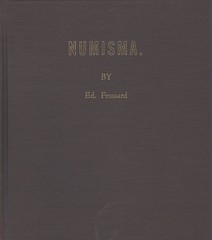
"I have copy #18 of the hard copy of Numisma and notes I made at the time of acquisition shows that it was printed in 1983."
Mike Bourne writes:
"My parents owned a graphic arts and printing company while also running the numismatic literature business. It was named Ramm Communications named for Remy/Avis/Mike/Marlene Bourne. 100 copies of a soft cover ringed bound edition were distributed by Cal Wilson and thru Ken Lowe of Money Tree. In addition a limited number of hard bound numbered copies were distributed to family, long term customers and to Ken Lowe and Cal Wilson. This was done in 1983. It is likely that the copy referenced was Ken Lowe's copy"
Thank you! I haven't seen the softcover edition. I have one of the hardbounds - my copy is pictured above. -Editor
To read the earlier E-Sylum article, see:
NOTES FROM E-SYLUM READERS: JANUARY 1, 2023 : John Igo, Numisma Reprint Information Sought
(https://www.coinbooks.org/v26/esylum_v26n01a07.html)
Other topics this week include the 1909 ANA Election. -Editor
QUERY: ALBERT LEVITT AND THE 1921 ASSAY COMMISSION
Gary Greenbaum has a question about 1921 Assay Commissioner Albert Levitt. -Editor
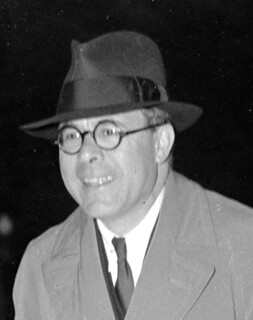 Hi, I'm Gary Greenbaum. In addition to being a lawyer, I write for Wikipedia. Some of my articles are on numismatics, but occasionally, an article I'm working on that has nothing to do with coins turns up an unexpected numismatic connection.
Hi, I'm Gary Greenbaum. In addition to being a lawyer, I write for Wikipedia. Some of my articles are on numismatics, but occasionally, an article I'm working on that has nothing to do with coins turns up an unexpected numismatic connection.
Currently, I'm working on the article on Albert Levitt. Briefly a federal judge, Levitt careened through an eccentric career in the law and public affairs. His most famous contribution to the law came with his 1937 challenge to the Supreme Court seating its latest member, Hugo Black. The resulting decision, Ex parte Levitt, is an important case on the law of standing, meaning you have to have sufficient connection to a matter to bring a lawsuit. The court said that Levitt's status as a citizen and member of the Supreme Court Bar did not entitle him to challenge Black's appointment. Levitt also, in 1950, ran against Richard Nixon for the Republican nomination for Senate in California, and finished sixth out of six.
VOCABULARY TERM: METAL CLEANING
Here's another entry from Dick Johnson's Encyclopedia of Coin and Medal Terminology. -Editor
Metal Cleaning. Any of various methods of removing dirt, some corrosion and minute surface defects from metal; these include: abrasive blasting, acid dip, blanching, heat treating, sandblasting, shot peening, barrel tumbling, and water hone. Blanks are often metal cleaned by pickling or by one of these abrasive methods at the same time they are annealed – softened by heat treating – before striking as a customary step of metalworking. Any of these steps will produce an activated surface on the blank. This is not a problem if the striking is done within a reasonable time (up to three months) otherwise the blanks will tone before striking.
FINDING AND BINDING SPINK'S NUMISMATIC CIRCULAR
Andrew Pollock passed along a nice British Numismatic Society blog article by Gary Oddie about assembling and binding a run of Spink's Numismatic Circular. Here's an excerpt - see the complete article online. -Editor
The recent acquisition of a block of loose copies of Spink's Numismatic Circular; 1911-1934, only lacking December 1912, has prompted me to look more closely at this publication. The group had been for sale on eBay in Italy for several months with a buy-it-now price and a surprisingly low FedEx shipping cost of £15. Whilst I already had a complete set of SNC back to 1947, a copy of Dave Greenhalgh's index, a few odd early single issues and a couple of early tatty annual volumes, I had never really considered going back further due to the difficulty of achieving completion.
A quick search of the usual suspects and the internet (Paul and Bente Withers at Galata, Douglas Saville, Chris Martin at Ancient & Oriental, AbeBooks (part of Amazon since 2008), BookFinder, and eBay) revealed an amazing coincidence. Between these sources it was possible to build a complete block from the first issue of December 1892 to December 1938, including the missing issue from December 1912! The prices were consistent and reasonable for a year's issue with a hardback binding, so the project began.
BRITISH NUMISMATIC SOCIETY MEETING AT NYINC
Peter Preston-Morley writes:
"The British Numismatic Society Meeting meeting at the NYINC show will take place in the Morgan Suite at the InterContinental New York Barclay, on E 48th Street, on Friday January 13th, at 4 PM.
"I'm very pleased to say that our speaker will be John Kraljevich, one of America's leading professional numismatists, who won't need any introduction to most of your readership. His talk is entitled "We Owe Allegiance to No Crown: the War of 1812 in American and British medals.
"All are welcome, and you don't have to be a member of the Society to attend."
2024 AIA/SCS CALL FOR PAPERS
Two numismatic conference sessions will be hosted at the 2024 Archaeological Institute of America/Society for Classical Studies (AIA/SCS) meeting in Chicago, IL and calls for papers are now open. -Editor
CFP: Coins, Copies, and Prototypes
Society of Classical Studies 155th Annual Meeting
JANUARY 4-7, 2024
CHICAGO
Call for Papers for Panel Sponsored by the Friends of Numismatics
Coins, Copies, and Prototypes
Organized by Roberta Stewart (Dartmouth College) and Nathan Elkins (American Numismatic Society)
THE BOOK BAZARRE
NUMISMAGRAM SELECTIONS: JANUARY 8, 2023
Jeremy Bostwick with Numismagram forwarded these four medals from his recent addition of new material online. In addition to those below, one will find an attractively toned papal medal, a large, glossy award medal from the 1862 world's exhibition in London, and a highly interesting New Year's medal from Germany featuring a sphinx, among other things. For all of the new items, please visit https://www.numismagram.com/inventory. -Editor
NUMISMATIC NUGGETS: JANUARY 8, 2023
Here's a selection of interesting or unusual items I came across in the marketplace this week. Tell us what you think of some of these. -Editor
1894 gold sovereign QUEEN VICTORIA coin.
DUG OUT OF THE GROUND AFTER MANY YEARS HIDDEN. THE PHOTOS CLEARLY SHOW THE POOR CONDITION OF THE COIN.
Passed along by Ken Spindler, who asks, "But will it slab?" Well, there are more than a few collectors who for grins compete for the lowest condition collection, so maybe this will find a home outside the melting pot. -Editor
To read the complete lot description, see:
1894 gold sovereign QUEEN VICTORIA coin
(https://www.ebay.com/itm/134393463848)
Other topics this week include a French Brothel Token. -Editor
USE OF SILVER AS MONEY IN ISRAEL
Howard Berlin passed along this Jerusalem Post article about the early use of silver as money in Israel. Thanks. -Editor
Archaeologists from the University of Haifa and the Hebrew University of Jerusalem have found silver coins made in Anatolia (Turkey) in the 17th century BCE, the Middle Bronze Age, at archaeological digs from the beginning of the Late Bronze Age, a century later.
The coins, which were used in regional trade, including with ancient Israel, were discovered at Tel Shiloh near Jerusalem, Tel Gezer on the western slopes of the Judean Hills and Tell al-Ajjul in the Gaza Strip.
BAR KOCHBA REVOLT COIN FOUND IN ISRAEL
Dick Hanscom forwarded this article on a Bar Kochba revolt coin found recently in Israel. Thanks. -Editor
Acoin from the Bar Kochba revolt was found recently during an archaeological dig in Murabba'at caves in the Nahal Darga Reserve in the Judean Desert, the Israel Antiquities Authority announced on Thursday.
The coin, dated to the second year of the revolt (133 AD), features a date tree on one side with the name "Shimon" on it. Shimon Bar Kochba was the leader of the revolt.
SHROPSHIRE HOARD DECLARED TREASURE
Thanks to David Sundman for passing along this Sunday Times article about a small hoard found in Shropshire. -Editor
What have the Romans ever done for us? In the case of one detectorist from North Wales, they have got him on the property ladder.
Darren Booth's discovery of 377 denarii coins in a Shropshire field has landed him a payday, the haul — apparently a soldier's savings — enabling him to obtain a mortgage.
ATHELSTAN MUSEUM BUYS KING'S COIN
Here's a good news story for a museum in Wiltshire, England - they've acquired a coin issued by the King their institution is named for. The coin will go on display late in January 2023. -Editor
A rare coin showing a king who ruled more than a thousand years ago has been bought by the museum bearing his name.
Anglo-Saxon King Athelstan has an empty memorial tomb in Malmesbury Abbey and is buried somewhere in the grounds, but nobody knows where.
THE MYSTERY OF THE RED QUARTERS
Tom Kays passed along this Retroist article about those red-painted quarters that come along once in a while. Thanks. I'm pretty sure we've covered the topic earlier, but was unable to locate it in our archive. -Editor
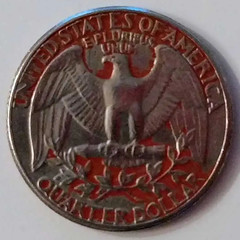 Have you ever sorted through your change and found an older quarter painted red, or the remnants of red paint that has been worn away during a few decades in someone's pocket or change jar? Congratulations! There is a good chance that you are holding a piece of arcade history.
Have you ever sorted through your change and found an older quarter painted red, or the remnants of red paint that has been worn away during a few decades in someone's pocket or change jar? Congratulations! There is a good chance that you are holding a piece of arcade history.
First of all, let me point out that there are a few alternative origins that are possible – but, not as neat as the arcade connection. Red quarters are also used for free laundromats and the occasional jukebox at the local tavern, but with change machines more available in 2017, and the increasing prices of these services, dollar bills are used much more often.
STUDENT STRIKES FIRST 2023 AUSTRALIAN COIN
Following a longstanding tradition, the Royal Australian Mint allowed a randomly chosen member of the general public to strike the first coins of the new year. -Editor
A Taiwanese exchange student has pressed the first coin of the year at the Royal Australian Mint in Canberra after only finding out about the annual tradition the day before.
It's been two years since coin enthusiasts have been able to gather in-person to mint the first coins of the year, but this time there were no long lines or people camping out overnight.
GALLIPOLI CONSPICUOUS GALLANTRY MEDAL
There's a memorable episode of the sitcom "Everybody Loves Raymond" where Raymond's policeman brother Robert takes a bullet in the line of duty. Their father insists he "got shot in the a$$" while Robert insists on saying it was "the upper thigh". Well, here's the story of a medal-winning seaman who saved his comrades after being shot in the "backside." -Editor
The medals of a heroic seaman who saved comrades despite being shot in the backside during the Gallipoli campaign are being sold at auction.
Leading Seaman William Pierce was hit in an assault on enemy lines but stayed to cover the retreat of colleagues.
BIDEN AWARDS PRESIDENTIAL CITIZENS MEDALS
The Presidential Citizens Medal doesn't get as much press as its' higher profile cousins - we last mentioned these in The E-Sylum twelve years ago in 2010. This week President Biden awarded fourteen of them. Here's an excerpt from a Wall Street Journal article. -Editor
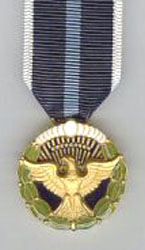 President Biden commemorated the second anniversary of the Jan. 6 riot by giving medals to law-enforcement officers who protected lawmakers that day and election officials who resisted efforts to overturn the results of the 2020 presidential contest.
President Biden commemorated the second anniversary of the Jan. 6 riot by giving medals to law-enforcement officers who protected lawmakers that day and election officials who resisted efforts to overturn the results of the 2020 presidential contest.
What you did was truly consequential,
Mr. Biden said during an afternoon ceremony in the White House's East Room.
Recipients included former Arizona House Speaker Russell Rusty
Bowers, a Republican who lost his seat in an August primary after resisting pressure from President Donald Trump to hold a hearing in the state that could have led to changing election results. Mr. Biden also posthumously recognized Brian Sicknick, a Capitol Police officer who died the day after the attack.
THE ARIAS ISSUE
PANAMANIAN BANKNOTES
A Stack's Bowers article by Chris Bulfinch discusses the rare "Arias issue" banknotes of Panama. Colorful notes with interesting designs. -Editor
Included in Session C – World Paper Money Part I of our upcoming January 2023 NYINC Auction are rare, attractive Panamanian banknotes (and specimen notes) issued over the course of a week in early October 1941. The exceedingly short circulating life of the Arias Issue
was a result of World War II-era geopolitical concerns, a story that, combined with the notes' rarity, makes them very popular with world paper money collectors.
Before being deposed in a coup organized by the Allies because of his sympathy for the Axis powers, Panamanian President Arnulfo Arias authorized official and private banks to issue paper money. Only one institution, the Banco Central Emisión de la República de Panamá, got around to issuing notes before Arias was removed from office on October 9 and sent into exile.
ARGENTINE ARTIST PAINTS ON BANK NOTES
It's a common worldwide phenomenon that when a country's currency value drops, artists and artisans capitalize on the opportunity to turn nearly worthless banknotes into something new. Here's an article about an artist in Argentina and his work. -Editor
Argentina's cash has lost so much value in recent years that local artist Sergio Guillermo Diaz finds painting on even the most valuable banknotes has become affordable.
With annual inflation that likely neared 100% last year, the largest denomination of Argentine currency, the 1,000-peso bill, is worth around $5.60 officially or just $3 on parallel markets commonly used to skirt capital controls.
2023 CHINESE NEW YEAR BANKNOTES
People in Singapore and elsewhere have been lining up to purchase Chinese New Year banknotes. -Editor
Long queues have formed at local banks across the island, as people start to withdraw fresh dollar bills for red packets ahead of Chinese New Year.
Some customers have resorted to waiting in line for hours just to get their hands on crisp notes.
LOOSE CHANGE: JANUARY 8, 2023
Here are some additional items in the media this week that may be of interest. -Editor
A Coin Update article by Dave Bowers examines Augustus Heaton's classic monograph and the rise of mint mark collecting. -Editor
From 1838 when the first branch mints opened, into the early 1890s, collecting coins was by date only. As hard as it may be to envision today, no one cared if a coin had a CC, S, or some other letter. Mint-marked issues that are considered great rarities today—the 1854-S $2.50 and $5 for example—were worth no more than a Philadelphia Mint coin, and an 1870-S Liberty Seated dollar had no extra value.
That changed in 1893 when Augustus G. Heaton published his landmark monograph, A Treatise on the Coinage of United States Branch Mints, for sale for just a dollar.
In that decade Heaton was one of the best-known figures in American numismatics and was important in the young American Numismatic Association as an officer and president. He also contributed to The Numismatist, including a poem about 13 silver barons
—famous silver coin rarities.
To read the complete article, see:
Bowers on Collecting: The rise of mint mark collecting
(https://news.coinupdate.com/bowers-on-collecting-the-rise-of-mint-mark-collecting/)
Other topics this week include Rome's Runaway Inflation and book care and cleaning. -Editor
ABOUT THOSE COIN ADS IN COMIC BOOKS
Len Augsburger passed along this fun article from Heritage Auctions about those coin ads in comic books. Thanks. For those of us of a certain age, they were a part of growing up as collectors. -Editor
Comic books of the 1960s often had intriguing coin ads promising prime investment opportunities. Since Heritage Auctions is of course known for its staff of ace numismatists, we decided to show one an ad from Captain Atom #85 (Charlton, 1967 – see image of the full ad below) to get the scoop.
Barry Sandoval: David, I've often wondered about these coin ads in Silver Age comics. If I had been around in 1967 and seen this ad, should I have sent off for the "scarce steel wartime penny set," and would the investment have paid off? Or would I have been better off socking away high-grade copies of that month's comics?
FEATURED WEBSITE: MPC FEST
This week's Featured Web Site is MPC Fest. The 2023 event will be held March 17-19.
The most important event for Military collectors! It's called the MPC Fest and it is held in Port Clinton, Ohio. Over 60 people with interests in all types of military numismatic collectibles will be there. There will be presentations, show and tell with items newly discovered, March Madness (a trivia contest with questions about military numismatics to determine the national championship collector), an auction, and more!

